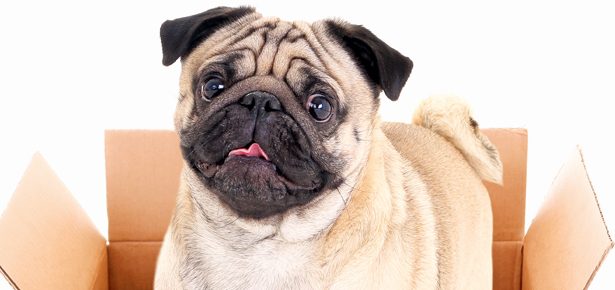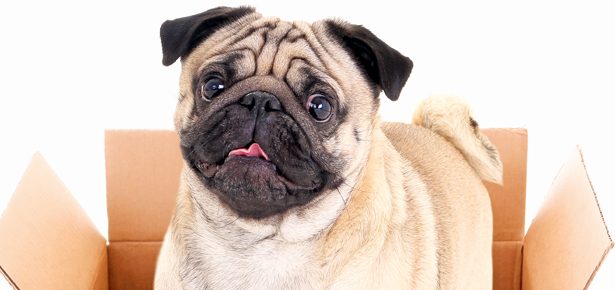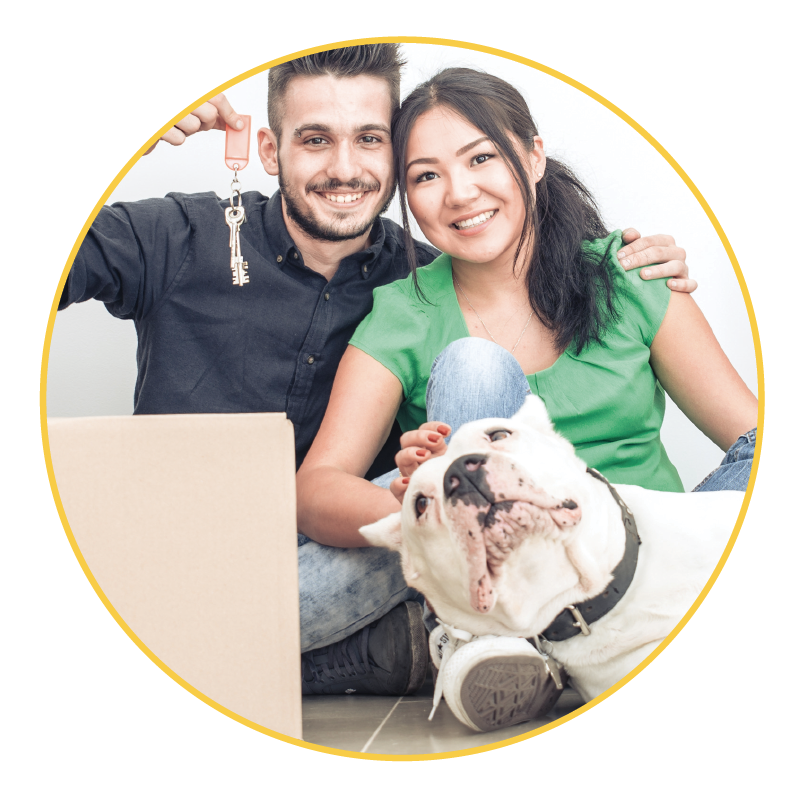

How to Make Moving Easier on Your Dog
A change of address can be upsetting. Here’s how to help your dog survive a move
You've been packing boxes all day and you still have rooms to go. You had the tape just a minute ago but now can't find it anywhere. You suspect you may have packed your keys in a box because you can't find them either. And you just discovered your friend completely forgot to label three boxes she just sealed, so you have no idea what's in them. Welcome to the wonderful adventure of moving!
Moving can be exceedingly stressful. Between coordinating leases or mortgages, packing, movers, utilities, and the many other demands on your time, it's definitely enough to make you wish you could just go to bed and wake up when it's all done. Your dog may not have to worry about making down payments or packing the fine china but moving is super stressful for dogs too.
Dogs are very much creatures of routine. Familiarity offers them security. When that routine gets completely disrupted due to a move, it can be very stressful for your canine friend. As a result, you may start to see behaviour issues. For example, some dogs chew when they are stressed. Just like you may reach for a soothing martini (if you haven't already packed your shaker), your dog may gnaw on things to help relieve his stress. The item gnawed on could just as likely be his favourite chew bone—or your couch. Another issue can be housetraining. A dog that hasn't had an accident in years may suddenly start peeing on your carpet or belongings.
If the move is causing you hassle, this in itself can affect your dog. Dogs are very in tune to our emotions; if we’re upset, they are often upset—they just show it differently than we do! Other stress signs you may see include panting, clinginess, excessive whining, pacing, barking, yawning, and lip licking. It's important to understand that sudden behavioural changes like these are not due to spite. Your dog isn't angry with you; he's stressed! So whatever you do don't get angry at your dog for exhibiting stress as it certainly won't help the situation.
Now that you know how much a move can upset your dog, what do you do about it?

1. Keep to his routine as much as possible. Try to feed him at his regular mealtimes and keep to his regular potty and exercise schedules. It's the change in routine that is upsetting him, so the closer you can stick to what your dog is used to, the more comfortable he will be with the chaos of packing and the new locale.
2. During the actual move, keep him out of the picture. During the actual move, keep him out of the picture. A stressed dog can be a clingy dog, and you don't want him getting underfoot while you're moving heavy items or transporting fragile objects. While you're busy coordinating the actual move, it can also be easy for your dog to slip out a door unnoticed, which is a panic you don't need! It's a good idea to board your dog until you're in your new place, preferably at a facility where he's already been and is comfortable. (Don't add a new boarding experience to his stress if you can avoid it.) Better yet, maybe a good friend will be happy to take your dog for an overnight stay. If you don't have to worry about your dog in the thick of a move, it will be less stressful for you too.
3. Keep his belongings nearby. Keep his bed or crate and favourite toys accessible so you can easily and immediately set them up in your new place. These familiar items will help him feel more relaxed. They signal “home” as they carry his scent and the scent from his previous home.
4. Be patient. Know that behavioural issues may not be limited to the actual move, but can extend into the early weeks in your new place when your dog is acclimating to your new location. This is normal. It can especially be an issue if you've had a significant change in environment, such as moving from the suburbs to a city. If you have concerns that your canine buddy is not adjusting well, please consult a reward-based professional dog trainer.
5. Don't forget to take care of yourself! When it comes to your dog adjusting, you are going to be his best remedy. Make sure you are keeping healthy habits, getting sleep, and eating healthy so you can stay strong and positive for your canine friend. This way you'll both be better prepared for new adventures in your new home. Then, you'll just have to worry about unpacking!
Teoti Anderson, CPDT, owns Pawsitive Results (getpawsitiveresults.com) and is the past president of the Association of Pet Dog Trainers, as well as the author of Your Outta Control Puppy, Super Simple Guide to Housetraining, Quick and Easy Crate Training, and Puppy Care and Training.
Join the newsletter and never miss out on dog content again!
"*" indicates required fields
By clicking the arrow, you agree to our web Terms of Use and Privacy & Cookie Policy. Easy unsubscribe links are provided in every email.